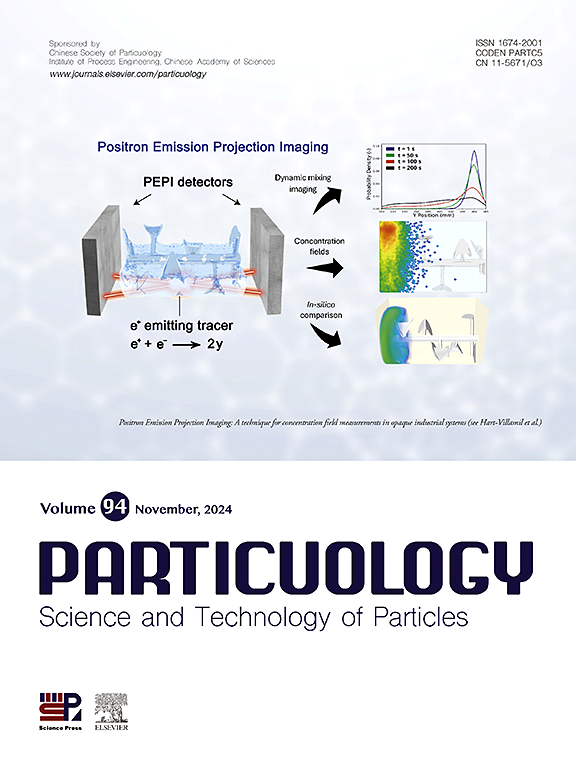Thermoconversion of organic solid waste in a spouted bed reactor: A review
IF 4.1
2区 材料科学
Q2 ENGINEERING, CHEMICAL
引用次数: 0
Abstract
Valorization of organic solid waste (OSW) is a promising avenue for the production of value-added products and renewable energy sources. This paper offers an exhaustive review of the thermochemical conversion processes in spouted bed reactors, which yield products like biochar, bio-oil, and syngas, as well as energy forms such as heat and electricity. While numerous studies have been conducted on thermoconversion in spouted beds, there is a scarcity of systematic reviews on this topic. This paper underscores the importance of spouted beds in torrefaction, pyrolysis, and gasification, drawing on both experimental and simulation perspectives. By focusing on reactor design, reaction condition optimization, and catalyst enhancement, OSW can be more efficiently transformed into valuable products and bioenergy. Furthermore, the integration of simulation and modeling offers profound insights into the intricate reactions that occur during thermal conversion. Current simulation studies in spouted bed reactors are primarily centered around reaction kinetics, Computational Fluid Dynamics (CFD) modeling, the Multiphase Particle-In-Cell (MP-PIC) approach, and process simulation. The future integration of Artificial Intelligence (AI) is anticipated to enhance parameter optimization with greater precision and facilitate industrial scale-up. The paper concludes with a synthesis and contemplation of the prospective advancements in spouted bed technology.

有机固体废物在喷淋床反应器中的热转化研究进展
有机固体废物(OSW)的增值是生产增值产品和可再生能源的一个有前途的途径。本文对喷淋床反应器中的热化学转化过程进行了详尽的回顾,这些过程可以产生生物炭、生物油和合成气等产品,也可以产生热能和电能等能源形式。虽然对喷淋床的热转化进行了大量的研究,但对这一主题的系统综述却很缺乏。本文从实验和模拟两方面强调了喷淋床在热解、热解和气化中的重要性。通过反应器设计、反应条件优化和催化剂优化,可以更有效地将OSW转化为有价值的产品和生物能源。此外,模拟和建模的集成为热转化过程中发生的复杂反应提供了深刻的见解。目前对喷淋床反应器的模拟研究主要集中在反应动力学、计算流体动力学(CFD)建模、多相颗粒池(MP-PIC)方法和过程模拟等方面。人工智能(AI)的未来集成有望提高参数优化的精度,并促进工业规模扩大。最后对喷床技术的发展前景进行了综合和展望。
本文章由计算机程序翻译,如有差异,请以英文原文为准。
求助全文
约1分钟内获得全文
求助全文
来源期刊

Particuology
工程技术-材料科学:综合
CiteScore
6.70
自引率
2.90%
发文量
1730
审稿时长
32 days
期刊介绍:
The word ‘particuology’ was coined to parallel the discipline for the science and technology of particles.
Particuology is an interdisciplinary journal that publishes frontier research articles and critical reviews on the discovery, formulation and engineering of particulate materials, processes and systems. It especially welcomes contributions utilising advanced theoretical, modelling and measurement methods to enable the discovery and creation of new particulate materials, and the manufacturing of functional particulate-based products, such as sensors.
Papers are handled by Thematic Editors who oversee contributions from specific subject fields. These fields are classified into: Particle Synthesis and Modification; Particle Characterization and Measurement; Granular Systems and Bulk Solids Technology; Fluidization and Particle-Fluid Systems; Aerosols; and Applications of Particle Technology.
Key topics concerning the creation and processing of particulates include:
-Modelling and simulation of particle formation, collective behaviour of particles and systems for particle production over a broad spectrum of length scales
-Mining of experimental data for particle synthesis and surface properties to facilitate the creation of new materials and processes
-Particle design and preparation including controlled response and sensing functionalities in formation, delivery systems and biological systems, etc.
-Experimental and computational methods for visualization and analysis of particulate system.
These topics are broadly relevant to the production of materials, pharmaceuticals and food, and to the conversion of energy resources to fuels and protection of the environment.
 求助内容:
求助内容: 应助结果提醒方式:
应助结果提醒方式:


